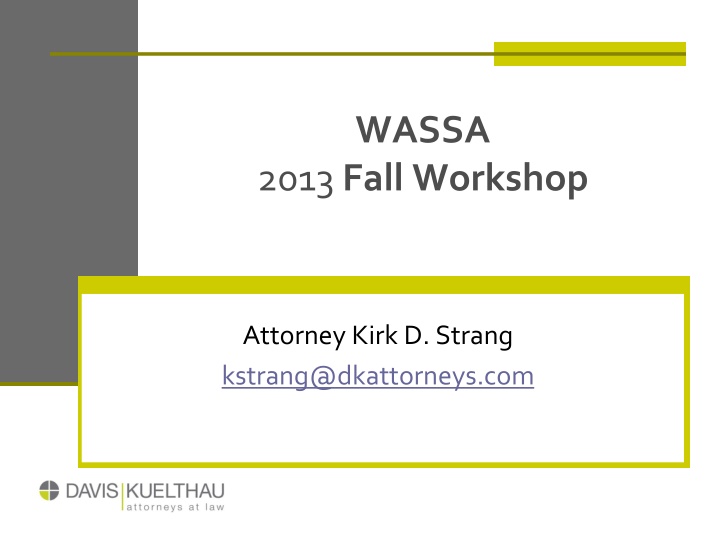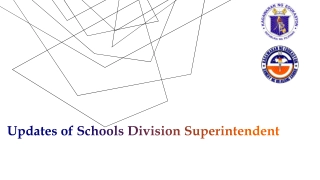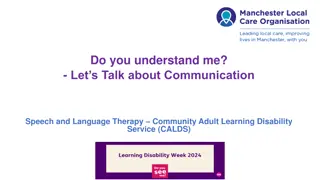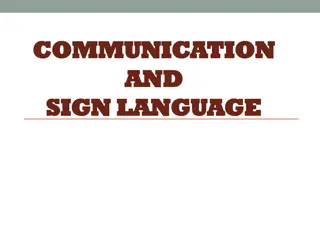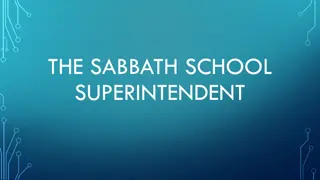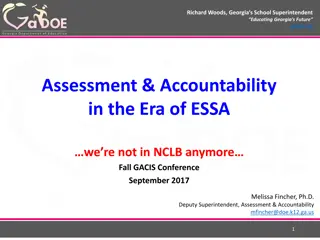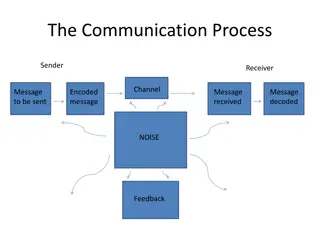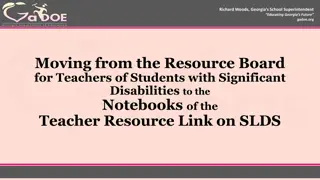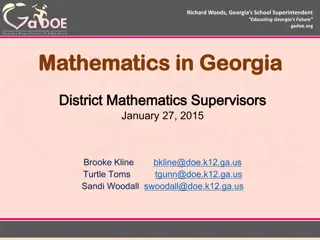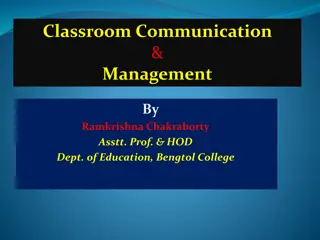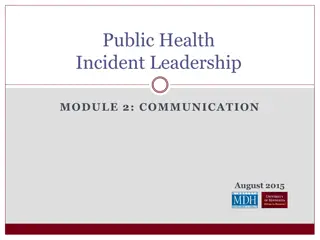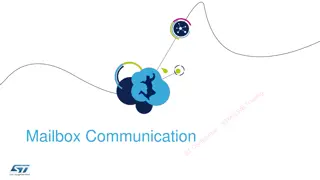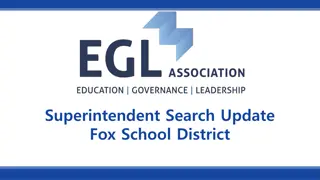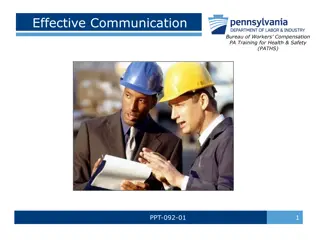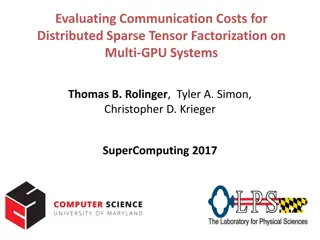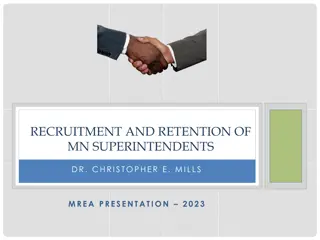Communication Challenges for Superintendent's Assistant
The role of a superintendent's assistant involves managing and safeguarding school district information, communicating leadership messages, preserving historical records, and being a trusted advisor. The assistant plays a crucial role in school board meetings, handling meeting packets, notices, agendas, minutes, and expulsion hearings. Confidentiality of pupil records is emphasized with precise guidelines to follow.
Download Presentation

Please find below an Image/Link to download the presentation.
The content on the website is provided AS IS for your information and personal use only. It may not be sold, licensed, or shared on other websites without obtaining consent from the author.If you encounter any issues during the download, it is possible that the publisher has removed the file from their server.
You are allowed to download the files provided on this website for personal or commercial use, subject to the condition that they are used lawfully. All files are the property of their respective owners.
The content on the website is provided AS IS for your information and personal use only. It may not be sold, licensed, or shared on other websites without obtaining consent from the author.
E N D
Presentation Transcript
WASSA 2013 Fall Workshop Attorney Kirk D. Strang kstrang@dkattorneys.com
Communications Challenges for the Superintendent s Assistant
Communications Challenges for the Superintendent s Assistant The role of a superintendent s assistant: The superintendent s assistant. The guardian of school district information. The messenger of the district s leadership. The historian. The kitchen cabinet.
The School Board Meeting The school board packet : The school board packet can include both open and closed session materials. Distribution through a board packet can change the record status of a document. Including closed session materials does not mean that they are now open and available for inspection (distributing them in open session, however, does mean that). Pupil record information is not necessarily appropriate to share with the school board, even if it is distributed in confidence (e.g., the legitimate educational interests, including safety interests standard.
The School Board Meeting The meeting notice/agenda Subject matter requirement. Informing the boilerplate provisions. Contingency planning for meeting location. Closed session notices.
The School Board Meeting Minutes of the meeting: What must be in the minutes? What is a good idea to include in minutes? What is a really bad idea to include in minutes? Closed and open session minutes. Publishing proceedings of the school board.
The School Board Meeting The expulsion hearing: The public notice should include Wis. Stat. 19.85(1)(f) and118.125. The statutory language regarding the parents/pupils right to demand a closed session creates false impressions. An expulsion hearing cannot be in open session. Ever. The 5 day notice rule does not include the day sent, but does include the day of hearing. The hearing notice can be sent by U.S. Mail. I send it both First Class and Certified, and then to both the pupil and the parents/guardians. You can notify the person identified as the guardian, but notify any parents whose parental rights have not been terminated, no matter where they live.
Pupil Records and Confidentiality Pupil records are confidential unless a specific exception says otherwise. School officials are members of the community and know things about kids like any other member of the community. However, people (especially parents) will presume that school officials are breaching pupil record confidentiality any time they comment on or gossip about a student. School officials can sometimes be held liable for breaching pupil record confidentiality even in circumstances where it appears that discussing the pupil openly was demanded by the parents. Pupil records are, indeed, a variety of public records. The rules of handling requests for those records are completely different, however, whether the subject is fees for production, who has access, whether and how they are redacted, and a host of other issues. Records that are prepared for administrator, staff, or faculty members personal use are not pupil records. Records are almost never prepared solely for personal use.
Pupil Records and Confidentiality Memorandum prepared by a teacher concerning a student s classroom behavior. Video of pupil going in and out of bathroom where a bomb scare note was found. Grades of students that are placed on the Honor Roll or Dean s List.
Pupil Records and Confidentiality The personal use exception isn t the easiest exception to rely on, especially when attempting to deny access to a record. By claiming that it isn t a pupil record, a school can actually make the document easier to subpoena. Personal use is almost always debated, because school personnel write things down for professional reasons. Personal use is hard to claim if the record has been used to communicate with others or has been shared for professional reasons.
Pupil Records and Confidentiality A pupil expulsion hearing is always confidential. Language in state statutes advising the pupil and parents of the right to demand a closed session does not entail the right to demand an open session. A school board cannot consider a confidential pupil matter at an open board meeting, even if the parents demand that the issue be addressed. Courts do not have unfettered discretion to compel schools to produce pupil records. Courts can, e.g., request progress records, order production of dropout records, and privately review records to determine whether they can be used to impeach witnesses. Not every school employee or even every teacher of a student is entitled to access their records. Parents are entitled to specified pupil records and are not required to pay for them.
Social Media and Internet Access to the Superintendent s Assistant Your Facebook page, Pinterest, LinkedIn, and Twitter. Pictures of you having a good time. Pictures of you with people that don t like the superintendent or the school board. Your online content: ask yourself if you seem like a gossip because of how you present yourself online. Your emails from a school district address.
Keeping Secrets With Records File access and use of locks Access logs and access procedures Pupil records, personnel files, health records, and investigation files Marking records confidential Disqualifying or restricting oneself where the appearance of access is problematic (e.g., family)
Keeping Secrets With Messages Passwords and changing passwords regularly (computers and voice mail, caller ID, and more) Texting: Should you ever text in your professional capacity, who, and why (and should it really be your phone)? Use of email confidentiality and privacy settings Printing and storing emails Screen view and access when you leave your desk Regulation of the IT Department or person
Keeping Secrets From Snoops, Gossips, and The Curious The town crier is not your friend ICTAI, ISICTA, LMTHA Trial balloons, righteousness, intimidation, color of process, and other prodding techniques Attend only those discussions that you should and remind the superintendent to consider your attendance as an issue (confidentiality, privileges, etc.) Fairness to personnel and other techniques
Communicating Effectively Should any communication take place at all and should it be in writing? What is the right medium: email, memo, call, conversation, or other? Should you use more than one for the same communication? Who are you speaking for (the school district, the superintendent, yourself)? These variables influence the choice of medium and the content of the message. The importance of clear English cannot be stressed enough. To provide clear, understandable statements To validate the school district as an educational institution To overcome prejudice and snobbery To avoid gamesmanship with responses or compliance To satisfy legal requirements (e.g., open meetings law)
Final Thoughts Credibility Serious tone and delivery Preparation Direct and forthright responses Admit what you don t know Grace and courtesy Belief in yourself and the school district s mission
